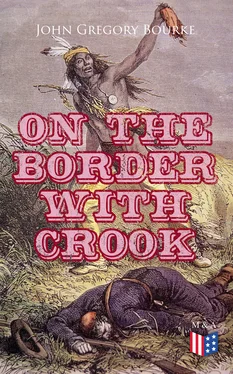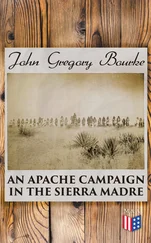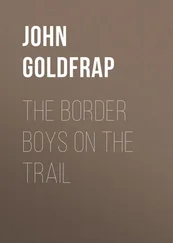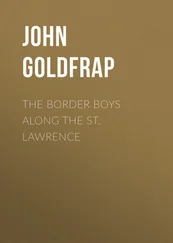Cushing, too, would have been swept off in the current had he not been seized in the strong grasp of Sergeant Warfield and “Big Dan Miller,” two of the most powerful men in the troop. The rain soaked through us all night, and we had to make the best of it until dawn, when we discovered to our great surprise and satisfaction that the stream, which had been gorged between the rocks at our camp, widened below, and this had allowed the current to expand and to slacken, dropping here and there in the valley most of the plunder which was of consequence to us, especially the hard bread.
All this meant an exasperating delay of twenty-four hours to dry our blankets upon the rocks, and to spread out our sodden food, and save as much of it as we could from mildew.
From there we made a detour over to Pinto Creek, where I may inform those of my readers who take an interest in such things, there are one or two exceptionally well-preserved cliff-dwellings, which we examined with much curiosity.
Not far from there we came upon the corn-fields of a band of Apaches, and destroyed them, eating as many of the roasting ears as we could, and feeding the rest to our stock.
Such were the military instructions of twenty and twenty-five years ago. As soldiers we had to obey, even if we could feel that these orders must have been issued under a misconception of the Indian character. The more the savage is attached to the soil by the ties of a remunerative husbandry, the more is he weaned from the evil impulses which idleness engenders. This proposition seems just as clear as that two and two make four, but some people learn quickly, and others learn slowly, and preachers, school-teachers, and military people most slowly of all.
Our presence was discovered by the Apache look-outs before we were able to effect a surprise, or, to be candid, we stumbled in upon the nook, or series of nooks, in which this planting was going on, and beyond exchanging a few shots and wounding, as we learned afterward, a couple of the young men, did not do much at that moment; but we did catch two squaws, from whom some information was extracted.
They agreed to lead us to where there was another “rancheria” a few miles off, in another cañon over toward Tonto Creek. We found the enemy, sure enough, but in such an inaccessible position, up among lofty hills covered with a dense jungle of scrub oak, that we could do nothing beyond firing shots in reply to those directed against us, and were so unfortunate as to lose our prisoners, who darted like jack-rabbits into the brush, and were out of sight in a flash. Why did we not catch them again? Oh, well, that is something that no one could do but the gentle reader. The gentle reader generally is able to do more than the actors on the ground, and he may as well be allowed a monopoly in the present case.
We growled and grumbled a good deal at our hard luck, and made our way to the Mesquite Springs, where the ranch of Archie Mac Intosh has since been erected, and there went into camp for the night. Early the next morning we crossed the Salt River and ascended the Tonto Creek for a short distance, passing through a fertile valley, once well settled by a tribe whose stone houses now in ruins dotted the course of the stream, and whose pottery, stone axes, and other vestiges, in a condition more or less perfect, could be picked up in any quantity. We turned back, recrossed the Salt or Salado, and made a long march into the higher parts of the Sierra Apache, striking a fresh trail, and following it energetically until we had run it into the camp of a scouting party of the First Cavalry, from Camp MacDowell, under Colonel George B. Sanford, who had had a fight with these same Indians the previous day, and killed or captured most of them.
Sanford and his command treated us most kindly, and made us feel at home with them. They did not have much to offer beyond bacon and beans; but a generous, hospitable gentleman can offer these in a way that will make them taste like canvas-back and terrapin. When we left Sanford, we kept on in the direction of the Sombrero Butte and the mouth of Cherry Creek, to the east, and then headed for the extreme sources of the San Carlos River, a trifle to the south.
Here we had the good luck to come upon a village of Apaches, who abandoned all they possessed and fled to the rocks as soon as our rapid advance was announced in the shrill cries of their vedettes perched upon the higher peaks.
In this place the “medicine-men” had been engaged in some of their rites, and had drawn upon the ground half-completed figures of circles, crosses, and other lines which we had no time to examine. We looked through the village, whose “jacales” were of unusually large size, and while interested in this work the enemy began to gather in the higher hills, ready to pick off all who might become exposed to their aim. They had soon crawled down within very close proximity, and showed great daring in coming up to us. I may be pardoned for describing in something of detail what happened to the little party which stood with me looking down, or trying to look down, into a low valley or collection of swales beneath us. Absolutely nothing could be seen but the red clay soil, tufted here and there with the Spanish bayonet or the tremulous yucca. So well satisfied were we all that no Apaches were in the valley that I had already given the order to dismount and descend the steep flanks of the hill to the lower ground, but had hardly done so before there was a puff, a noise, and a tzit!—all at once, from the nearest clump of sacaton or yucca, not more than a hundred yards in front. The bullet whizzed ominously between our heads and struck my horse in the neck, ploughing a deep but not dangerous wound.
Our horses, being fresh “broncos,” became disturbed, and it was all we could do to keep them from breaking away. When we had quieted them a little, we saw two of the Apaches—stark naked, their heads bound up with yucca, and their bodies red with the clay along which they had crawled in order to fire the shot—scampering for their lives down the valley.
We got down the hill, leading our horses, and then took after the fugitives, all the time yelling to those of our comrades whom we could see in advance to head the Indians off. One of the savages, who seemed to be the younger of the two, doubled up a side ravine, but the other, either because he was run down or because he thought he could inflict some damage upon us and then escape, remained hidden behind a large mesquite. Our men made the grievous mistake of supposing that the Indian’s gun was not loaded. Only one gun had been seen in the possession of the two whom we had pursued, and this having been discharged, we were certain that the savage had not had time to reload it.
It is quite likely that each of the pair had had a rifle, and that the young boy, previous to running up the cañon to the left, had given his weapon to his elder, who had probably left his own on the ground after once firing it.
Be this as it may, we were greeted with another shot, which killed the blacksmith of “K” Troop, First Cavalry, and right behind the shot came the big Indian himself, using his rifle as a shillelah, beating Corporal Costello over the head with it and knocking him senseless, and then turning upon Sergeant Harrington and a soldier of the First Cavalry named Wolf, dealing each a blow on the skull, which would have ended them had not his strength begun to ebb away with his life-blood, now flowing freely from the death-wound through the body which we had succeeded in inflicting.
One horse laid up, three men knocked out, and another man killed was a pretty steep price to pay for the killing of this one Indian, but we consoled ourselves with the thought that the Apaches had met with a great loss in the death of so valiant a warrior. We had had other losses on that day, and the hostiles had left other dead; our pack-train was beginning to show signs of wear and tear from the fatigue of climbing up and down these stony, brush-covered, arid mountain-sides. One of the mules had broken its neck or broken its back by slipping off a steep trail, and all needed some rest and recuperation.
Читать дальше












